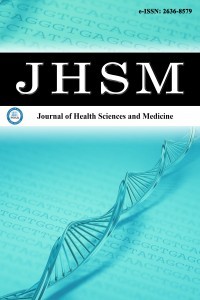Relationship between mental symptoms, dietary compliance and glucose levels of diabetic patients in isolation during COVID-19 pandemic
anxiety home isolation, covid 19, phone visits,
___
- Huang Y, Zhao N. Generalized anxiety disorder, depressive symptoms and sleep quality during COVID-19 outbreak in China: a web-based cross-sectional survey. Psychiatry Res 2020; 288: 112954.
- Zhou J, Tan J. Diabetes patients with COVID-19 need better blood glucose management in Wuhan, China. Metabolism 2020; 107: 154216.
- Öztürk Durmaz Ş, Sümer Coşkun A, Yalçın AN. Clinical and prognostic evaluation of patients admitted to the COVID-19 pandemic unit of the emergency department. J Health Sci Med 2021; 4: 835-9.
- Wang A, Zhao W, Xu Z, Gu J. Timely blood glucose management for the outbreak of 2019 novel coronavirus disease (COVID-19) is urgently needed. Diabetes Res Clin Pract 2020; 162: 108118.
- Guo W, Li M, Dong Y, et al. Diabetes is a risk factor for the progression and prognosis of COVID-19. Diabetes Metab Res Rev 2020; 36: e3319.
- Franciosi M, Pellegrini F, De Berardis G, et al. QuED Study Group. The impact of blood glucose self-monitoring on metabolic control and quality of life in type 2 diabetic patients: an urgent need for better educational strategies. Diabetes Care 2001; 24: 1870-7.
- Venkatesh A, Edirappuli S. Social distancing in covid-19: what are the mental health implications? BMJ 2020; 369: m1379.
- Jeong H, Yim HW, Song YJ, et al. Mental health status of people isolated due to Middle East Respiratory Syndrome. Epidemiol Health 2016; 38: e2016048.
- Ahorsu DK, Lin CY, Imani V, Saffari M, Griffiths MD, Pakpour AH. The Fear of COVID-19 Scale: Development and Initial Validation. Int J Ment Health Addict 2020: 1-9.
- Şahin Özdemirel T, Akkurt ES, Ertan Ö, Gökler ME, Akıncı Özyürek B. Complications with moderate-to-severe COVID-19 during hospital admissions in patients with pneumonia. J Health Sci Med 2021; 4: 766-71.
- Forouhi NG, Wareham NJJM. Epidemiology of diabetes. 2010. 38: 602-6.
- Schiel R, Müller UA, Rauchfub J, Sprott H, Müller R. Blood-glucose self-monitoring in insulin treated type 2 diabetes mellitus a cross-sectional study with an intervention group. Diabetes Metab 1999; 25: 334-40.
- Karter AJ, Parker MM, Moffet HH, et al. Longitudinal study of new and prevalent use of self-monitoring of blood glucose. Diabetes Care 2006; 29: 1757-63.
- Bergenstal RM, Gavin JR 3rd; Global Consensus Conference on Glucose Monitoring Panel. The role of self-monitoring of blood glucose in the care of people with diabetes: report of a global consensus conference. Am J Med 2005; 118: 1S-6S.
- Pastors JG, Warshaw H, Daly A, Franz M, Kulkarni K. The evidence for the effectiveness of medical nutrition therapy in diabetes management. Diabetes Care 2002; 25: 608-13.
- Anderson RJ, Grigsby AB, Freedland KE, et al. Anxiety and poor glycemic control: a meta-analytic review of the literature. Int J Psychiatry Med 2002; 32: 235-47.
- Surwit RS, Schneider MS, Feinglos MN. Stress and diabetes mellitus. Diabetes Care 1992; 15: 1413-22.
- Roy T, Lloyd CE. Epidemiology of depression and diabetes: a systematic review. J Affect Disord 2012; 142 Suppl: S8-21.
- Bădescu SV, Tătaru C, Kobylinska L, et al. The association between Diabetes mellitus and Depression. J Med Life 2016; 9: 120-5.
- Lustman PJ, Clouse RE. Depression in diabetic patients: the relationship between mood and glycemic control. J Diabetes Complications 2005; 19: 113-22.
- Jacka FN, Pasco JA, Mykletun A, et al. Association of Western and traditional diets with depression and anxiety in women. Am J Psychiatry 2010; 167: 305-11.
- Yayın Aralığı: Yılda 6 Sayı
- Başlangıç: 2018
- Yayıncı: MediHealth Academy Yayıncılık
Murat Bulut ÖZKAN, Murat Baki YILDIRIM, Ramazan TOPCU, Veysel Barış TURHAN
Sezgi ŞAHİN DUYAR, Deniz ÇELİK, Selma FIRAT
Erkan ERDUR, Özgen Ahmet YILDIRIM, Halil KÖMEK, Kerem POYRAZ, Mustafa ÇELİK, Metin YAMAN
Bahadır SANCAR, Numan DEDEOĞLU, Yunus ÇETİNER, Cüneyt Asım ARAL, Oğuzhan ALTUN
Erkan ERDUR, Özgen Ahmet YILDIRIM, Halil KÖMEK, Kerem POYRAZ, Mustafa ÇELİK, Metin YAMAN
Sertan BULUT, Deniz ÇELİK, Hakan ERTÜRK, Harun KARAMANLI, Mustafa Engin ŞAHİN, Özlem SÖNMEZ, Çiğdem BİBER
Ayşegül ALPCAN, Serkan TURSUN, Yaşar KANDUR, Mustafa Çağlar YÖRGÜÇ, Meryem ALBAYRAK
Using the fractal dimension method to assess ossification after open sinus lift surgery
Bahadır SANCAR, Numan DEDEOĞLU, Yunus ÇETİNER, Cüneyt Asım ARAL, Oğuzhan ALTUN
